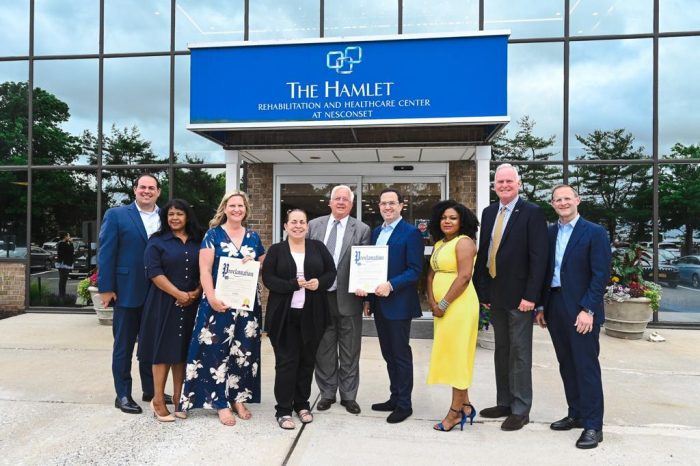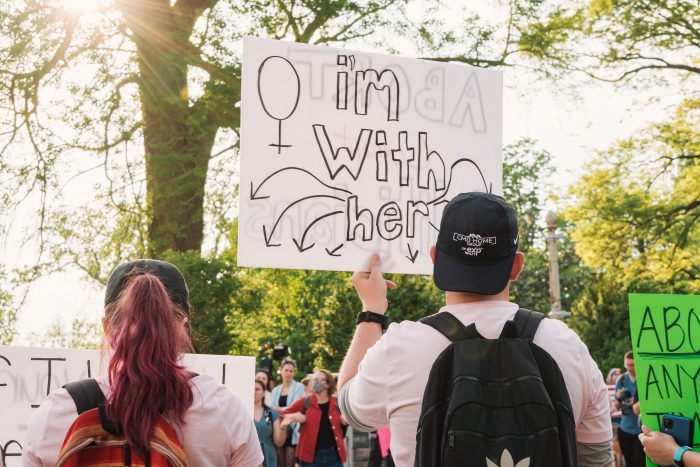Within 48 hours, The Smithtown Library Board of Trustees reversed a controversial decision made at its June 21 meeting.
Initially, the trustees voted 4-2, with one member absent, to remove pride displays, which included signs and books, in the children’s sections in its Smithtown, Commack, Kings Park and Nesconset branches. Two days later, the board held an emergency meeting and reversed its decision, again 4-2, with one board member abstaining.
The reversal came after criticism from the community on social media platforms. Among the critics were Gov. Kathy Hochul (D), the New York Library Association and author Jodi Picoult, who grew up in the town and was a page at the library when she was younger. She said on her Facebook page the initial decision “disgusts me and makes me reevaluate an institution that I have praised for being formative in my life as an author.”
The books remained available in the library’s children’s collection during the temporary removal and could be checked out, according to a June 22 memo from library trustees. Pride displays in the adult and teen sections remained.
After the reversal of the decision during the board’s emergency June 23 meeting, another memo was posted to the library’s website announcing the rescinding of the decision.
“The majority of the board recognizes that our earlier decision was made without the time, care and due diligence that a decision of this type deserves and that it was the wrong decision,” the memo read.
No public comments were accepted during the June 23 meeting, which was held via Zoom.
Thomas Maher, vice president of trustees, said at this meeting he supports the LGBTQ+ community’s rights. He said during the June 21 meeting, there was a passionate discussion about the displays, and the subject was discussed for a while. It was discovered there wasn’t a library policy about internal displays. He said his initial vote to remove the displays “was intended to enable the library to continue to offer all of its existing resources to all of its patrons in a peaceful and cooperative manner during this time of transition.” On June 23, he voted for the return of the displays.
Trustee Marie Gergenti voted twice for the removal. She said during the June 23 meeting she received messages from patrons.
“They felt that little children were exposed to some images in some of those books, and they weren’t happy about it,” she said.
Theresa Grisafi, a trustee who also voted twice for the removal, added many felt the displays in the children’s rooms were not age appropriate for young library patrons.
“The concern was for the small children,” she said.
She said she tried to convey that at the initial meeting and said it had nothing to do with anyone’s personal feelings.
Trustee member Marilyn LoPresti abstained from voting on June 23 and said she would like to research the matter further.
Library board president Brianna Baker-Stines said at the June 23 meeting, “We assumed a role that was not our job.”
Baker-Stines added that it was the librarians’ jobs to set up displays and “we need to trust the staff we hired.”
In an email to TBR News Media, Baker-Stines said in order to create a policy regarding internal displays, legal counsel advised that a standing committee for policy creation would first need to be created. While the board has multiple standing committees, the previous ones were only ad hoc. Baker-Stines said during her time on the board the members have only had to amend policies and not create new ones, unless based on an immediate need such as the work-from-home policy adopted at the beginning of the pandemic. She said the members realized it would take several steps to establish a proper committee.
“We knew that this process might take several meetings, which may be why some trustees were in a rush to remove the pride display that night,” she said.
Initial news coverage reported that the books were removed from the children’s collections when they were not.
“I think the wording on the motion may have led some of the media to believe the books were removed all together,” she said.
Baker-Stines said she “was devastated by the vote to remove the pride displays” and added “the library should be a safe space for every member of the public.”
As former library page and reference clerk at Hauppauge Public Library, she said, “I have been a part of the creation of many library displays, including Pride month displays. These are materials that can be lifesaving, and also materials that are requested by patrons during this time.”
Currently, the trustees have 900 emails to go through after the community reacted to the board’s initial decision.
David Kilmnick, nonprofit LGBT Network president and CEO, said while the removal of the displays never should have happened, the community’s response “shows the power that we have as a community to do the right thing and that right thing is so simple — it is creating safe learning spaces for all of our children.”
He said the removal of the displays could have a traumatic effect on “someone seeing themselves exist one day and then erased the next and for no good reason other than hate and bias.”
Kilmnick added the community’s response showed an “outpouring of support and love.”
“There are more people on the side of equality, equity, safety and love than on the other side,” he said. “We just all have to work together and not be afraid, and it showed what we can do in a very fast, rapid, effective way when we do this together.”
The pride displays in the Smithtown Library branches will remain until July 15.











































